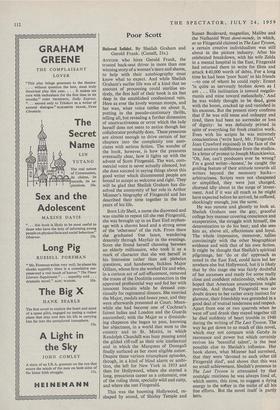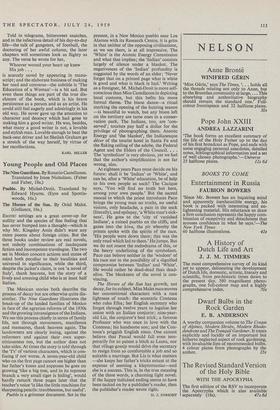Poor Scott
Beloved Infidel. By Sheilah Graham and Gerold Frank. (Cassell, 21s.)
ANYONE who hires Gerold Frank, the trusted back-seat driver in more than one winning story of a woman's tears and shame, to help with their autobiography must know what to expect. And while Sheilah Graham's earlier life was of a kind that no amount of processing could sterilise en- tirely, the first half of their book is six feet deep in the established confessional vein. Here as ever the lovely woman stoops, and her wan, wiser voice tattles on about it, putting in the pseudo-cautionary thrills, telling all, but revealing a further dimension of unattractiveness or error which the lady herself does not seem to notice though her collaborator probably does. These pressures are almost enough to drive certain of her chapters into the complexity one asso- ciates with serious fiction. The wonder of the book, however, is how the pressures eventually clear, how it lights up with the advent of Scott Fitzgerald. The wan, com- mercial voice is never actually silenced, but she does succeed in saying things about this good writer which disinterested people are bound to accept as welcome and right. They will be glad that Sheilah Graham has dis- solved the anonymity of her role in Arthur Mizener's biography of Fitzgerald and has described their time together in the last years of his life.
Born Lily Sheil, a name she disowned and was unable to repeat till she met Fitzgerald, she was brought up in an East End orphan- age with a shaven head and a strong sense of the 'otherness' of the rich. From there she graduated free lance, wandering dreamily through Mayfair in the evenings. Soon she found herself choosing between an elderly millionaire, who took it as a mark of character that she wet herself in his limousine rather than ask plebeian questions, and handsome, feckless Major Gillam, whose firm she worked for and who, in a curious act of self-effacement, removed the traces of the Doolittle connection in the approved professorial way and fed her with innocent biscuits while he dressed con- tinually for regimental dinners. She married the Major, medals and beaux yeux, and they were afterwards presented at Court. Mean- while she had become one of Cochran's fairest ladies and London and the Guards succumbed; with the Major as a diminish- ing chaperon she began to pass, knowing her abjectness, in a world that went to the country and to St. Moritz, in which Randolph Churchill was busy passing amid the gilded riff-raff as their sole intellectual and in which the Marquess of Donegall finally surfaced as her most eligible suitor. Despite these various triumphant episodes, though, in a kind of blind alarm or ambi- tion, she left for New York in 1933 and then for Hollywood, where she started a long, precarious career as a columnist, one of the ruling three, specially wild and catty, and where she met Fitzgerald.
This was the booming Hollywood, re- shaped by sound, of Shirley Temple and
Sunset Boulevard, magnolias, Malibu and the Nathaniel West demi-monde, in which, or so Fitzgerald claimed in The Last Tycoon, a certain creative individualism was still about in the picture industry. After his celebrated breakdown, with his wife Zelda in a mental hospital in the East, Fitzgerald had returned there to write for films and attack 8 40,000 worth of debts. For a long time he had been `poor Scott' to his friends —to one of whom he could reply: Ernest `is quite as nervously broken down as I am . . . His inclination is toward megalo- mania and mine toward melancholy.' And he was widely thought to be dead, gone with the boom, cracked up and vanished in his excesses. But the present story confirms that if he was still tense and unhappy and tired, there had been no surrender or loss of dignity: he was definitely primed in spite of everything for fresh creative work. Even with his scripts he was extremely conscientious ('write hard, Mr. Fitzgerald,' Joan Crawford enjoined) in the face of the usual anxious indifference from the studios. In a letter of protest to Joseph Manckiewicz, `Oh, Joe, can't producers ever be wrong? I'm a good writer—honest,' he caught the guiding feature of their attitude towards all writers beyond the necessary hacks— arbitrariness. Scripts were not cheapened or simplified, they were just changed, churned idly about in the surge of invest- ment. And if it was all much as he might have expected before he arrived, he suffered, shockingly enough, just the same.
He was remote and ghostly to look at. Sheilah Graham sees the gay, graceful college boy manner covering conscience and exasperation, the struggle with himself, the determination to do his best; and she sees him as, above all, affectionate and loyal. The whole impression, moreover, tallies convincingly with the other biographical evidence and with that of his own fiction. It might be thought that Sheilah's spiritual pilgrimage, her 'do or die' approach as noted in the East End, could have led her nowhere else but Hollywood, but it is likely that by this stage she was fairly doubtful of her successes and ready for some really close and confident relationship, which she hoped that American emancipation might provide. And though Fitzgerald was no doubt drawn to her rather crazy instinct for glamour, their friendship was grounded in a good deal of mutual tenderness and respect. Apart from one or two quarrels when he went off and drank they stayed together till he died suddeniy of heart trouble in 1940 during the writing of The Last Tycoon. The way he got down to so much of this novel, which may not compare with Gatsby in resonance and power but which certainly revives his 'beautiful talent', is the best possible clue to Sheilah's influence. Her book shows, what Mizener had surmised, that they were 'devoted to each other till Fitzgerald died', and shows that this was no small achievement. Sheilah's presence in The Last Tycoon is attenuated by that nostalgic mistiness he was always fond of, which seems, this time, to suggest a dying energy in the welter in the midst of all his fine efforts. But the novel itself is partly hers.
Told in telegrams, bittersweet snatches, and in the infectious detail of his day-to-day life—the talk of gangsters, of football, the doctoring of her awful column, the later chapters will sometimes look as flighty as any. The verse he wrote for her, Whoever wound your heart up knew His job . . , is scarcely saved by appearing in manu- script; and the elaborate business of making her read and converse—the subtitle is 'The Education of a Woman'—is a bit sad. But even these things are part of the true dis- closure of the book, which is his brave persistence as a person and as an artist. He could still feel eagerly and admiringly in his old way. He never gave up the attention to character and decency which had gone to making him a good writer. He was, besides, what many a good writer is not, a lovable and stylish man. Lovable enough to beat the back-seat driver and let Sheilah Graham go a stretch of the way herself, by virtue of her recollections.
KARL MILLER







































 Previous page
Previous page